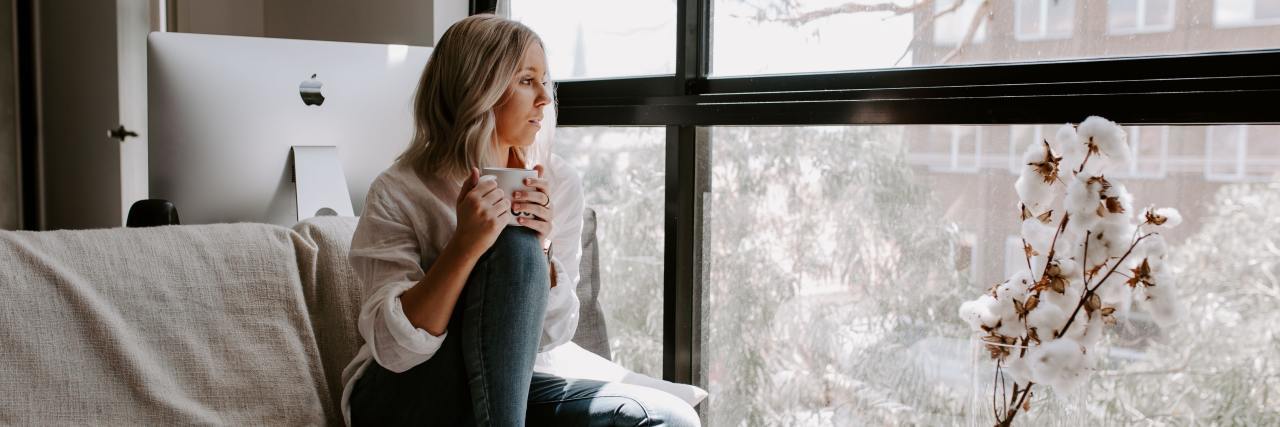When You Actually Need ‘Alone Time’ for Your Mental Health During Social Distancing
Editor's Note
Join The Mighty’s Coronavirus group to connect with other Mighties living through the pandemic. Read the latest updates, share helpful tips, or give and receive virtual support.
Alone time is a precious thing. But right now, with the self-isolation that accompanies the coronavirus (COVID-19) pandemic, many of us are experiencing too much “alone time.” But many of us need more.
Alone time has been important to me as I have struggled with bipolar disorder. I have a loving, supportive husband who is there when I need him to be, but even he knows that, sometimes, what I need is to be left alone.
Sometimes the world is too much with us, and we long to escape — read a book, hide under the blankets, just sit in the corner and think.
At times like that, interacting with another person can feel like an intrusion, an annoyance, unwelcome. Alone time can allow you to catch your breath, calm yourself, practice mindfulness or simply be alone with your feelings.
Of course, getting alone time is not always easy, especially now when we may be cooped up with our nearest and dearest, with no respite in sight. In my opinion, these are the times when a bit of alone time is even more necessary. Even with people you love, being with them 24 hours a day, every day, will begin to wear on you all. Stress builds and you may be triggered by noise, conflict or other stimuli.
I’m lucky. My supportive husband knows, if his other efforts at drawing me out (by offering me food, or a movie, or music) have failed, the greatest gift he can give me is alone time. He’ll even ask me if I need alone time, in case I don’t realize that is exactly what I do need.
I’m also lucky there is a dedicated space in my house that is perfect for alone time — my study. It has a computer, music, comfort objects, games, favorite pictures and more. It even has a comfy chair so that I can just sit and think if that is what I need to do. I know I come at this topic from a place of privilege.
Making mental and physical space for alone time is harder when you have a roommate or a family that doesn’t understand the concept of alone time. The TV may be blaring, the washer clanking, the kids yelling, the spouse being needy. There may be someone in every room of the house, making noise or demanding your attention. Sometimes you can’t even be alone in the bathroom. You want everything to stop, just for a while.
In situations like that, you may have to ask for alone time. First, realize that it’s a reasonable request. Suggest ways to make it happen: “I need to be alone in the basement (garage, kitchen, yard, whatever) for a while. Don’t disturb me unless someone’s bleeding or something’s on fire.” Offer to return the favor. If you’re feeling pent up, chances are someone else in the house is too.
Of course, too much of a good thing is not necessarily a good thing. Even though I need a fair amount of alone time, too much can leave me stuck inside my own head — not always a comfortable place to be. I can brood, catastrophize, feel lonely or bored, give in to depression. It helps if I can recognize when alone time is turning toxic like that. When I’ve had enough alone time, I can choose to leave that behind and rejoin the world in a better frame of mind.
As far as I can see, alone time is vital for every person, even the very gregarious. It allows us to let go and drop our metaphoric masks. But alone time is particularly necessary for those with mental illness. The ability to be alone with oneself can be a powerful step in understanding and healing. And whether time alone is the norm or the exception now, people’s mental health suffers.
Connection is what we hear most about – virtual meetings, video chats, texts, and calls – but alone time is vital too. Treasure it when you get some.
For more on the coronavirus, check out the following stories from our community:
- What You Should Know About Social Distancing During COVID-19
- 7 Things to Do If Social Distancing Is Triggering Your Depression
- An Activist-Therapist’s 15 Affirmations for Hope Amidst COVID-19
- What to Do If You’re Stuck With an Abusive Person During the Coronavirus Pandemic
- 10 COVID-19 Emotions You’re Not the Only One Having
Photo by Trent Szmolnik on Unsplash

